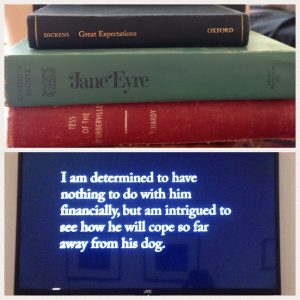Can Faxes be Literature?
As I sat down in front of Marie Shannon’s The Aachen Faxes at the Dunedin Public Art Gallery, I started musing on what we’ve been learning this semester. I was particularly focussed on the question of what makes something literature. Was this digital art instillation in front of me literature? Was that interactive fiction I had so much fun figuring out and trying to win last week literature? Could videogames be literary?
Whilst I am, and always have been, an avid reader, I had never given much thought to what makes something “literature”. In fact, the word was so overused in my life that it seemed to lack any meaning at all. Kind of like when you say a word over and over so many times that it starts to sound like nonsense. But, once I gave it some thought I realised I did, in fact, have some implicit biases and notions about what makes something literary. I knew that I wasn’t bragging about the fact I had read the entire Twilight Saga, and I never read Fifty Shades of Grey, purely on principle. I knew that I had never even given a thought to the idea that a videogame could be literature , and I had always considered interactive or web based fictions to be just fun little games. Once I had sifted through my deeply held notions of what “literature” actually means, all I was left with were a couple of thick, heavy, leather bound Victorian era novels that require several weeks to read, and several more weeks to understand. Ultimately, that is what it came down to for me – literature had to be hard work, and literature had to be on paper. How else was I supposed to read on the bus to show the world how clever and literary I was?
But, over the past three months I have had my notions of what constitutes literature brought to my attention, interrogated, and ultimately brought back to me newly formed and completely opened up. I am still not entirely sure what constitutes literature, but I am far more open minded now, and I accept that literature does not always have to be inside a physical book. And so, I was able to approach The Aachen Faxes with an open mind. I was able to appreciate the way that Shannon engages the viewer by presenting a compelling, fragmented narrative that puts the responsibility of deciphering the story onto the reader. The pieces of one-sided correspondence slowly come together over the fifteen and a half minutes of viewing time until a narrative emerges. While listening to a soft backing track of cello music, the viewer slowly begins to understand the impact of time and distance on a person, and on their relationship with their loved one back home.
So, is a fifteen-minute long video clip made up of snippets of faxes with a cello backing track literature? I’m not sure – but the fact I am even considering it shows how much more open minded I have become.



